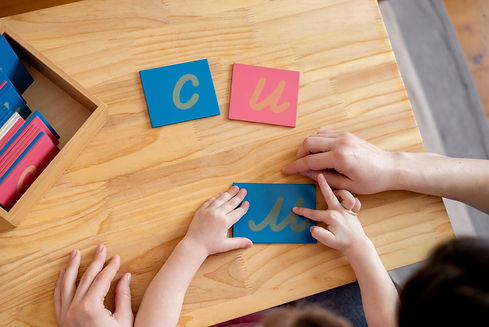THE PROGRAM
What We Learn During Our Stay

Practical Life
The Practical Life is an essential component of the Montessori education method, focusing on everyday tasks that help children develop independence,order, concentration and coordination. It has pencil grip training and life skills. as indirect aim. This approach encourages children to engage in activities such as pouring, cleaning, and food preparation, fostering their concentration coordination, and confidence. By participating in these practical tasks, children learn to care for themselves and their environment, promoting a sense of responsibility and belonging. Overall, Montessori Practical Life activities lay the foundation for lifelong learning and self-sufficiency.

Sensorial
Montessori sensory activities are designed to engage children's senses promote hands-on learning. These activities encourage exploration and discovery, allowing to develop fine motor skills and cognitive abilities. By using various materials textures, children can enhance their sensory awareness while fostering creativity and independence. Incorporating sensory activities into daily routines can significantly support a child's overall development.


Math
Since Montessori education emphasizes hands-on learning, particularly in the teaching of math. In a Montessori classroom, children interact with tactile materials that help them understand abstract mathematical concepts. This approach encourages exploration and self-discovery, allowing students to learn at their own pace. By integrating math into everyday activities, Montessori fosters a natural curiosity and appreciation for numbers and problem-solving from an early age.
Language
Montessori language education focuses on fostering children's natural curiosity and love for learning. It emphasizes hands-on experiences and encourages children to explore language through engaging activities and materials. The goal is to develop their communication skills,vocabulary, and comprehension in a supportive and nurturing environment. By integrating language learning with other subjects, Montessori methods help children become confident and independent learners.


Cultural Studies
Montessori cultural studies encompass a diverse range of subjects that introduce to the world around them. This area of learning fosters an appreciation for different cultures, languages, geography, art, bontany, zoology, music and history. Through practical activities and exploration, develop a deeper understanding of their place in the global community By encouraging curiosity and respect for diversity, Montessori cultural studies prepare young learners to informed and compassionate global citizens.
Outdoor Play
Outdoor unstructured playtime is essential for children's development, allowing to explore their surroundings and engage in activities that enhance their gross motor skills. Whether climbing trees, running, or playing games, children naturally develop coordination, balance, and strength during this free play. This type of play encourages creativity and problem-solving as they navigate various challenges their environment. Embracing outdoor play helps children thrive physically and mentally, fostering a love for nature and active lifestyles.

